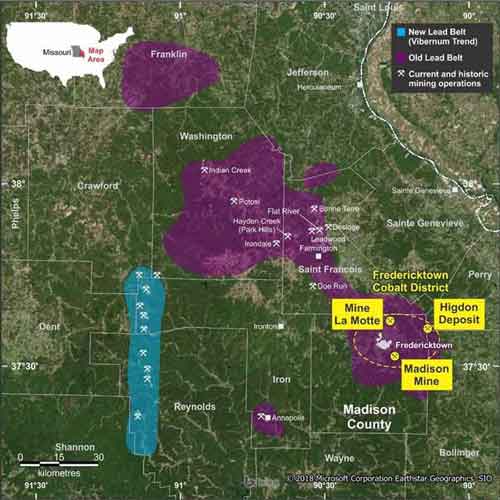Pure Minerals establishes itself as a low-cost EV metals explorer with cobalt deal
Mining
Mining
Special report: Pure Minerals is capitalising on the hot electric vehicle market by striking a lucrative deal that doesn’t require a lot of cash but has plenty of upside.
The company (ASX:PM1), which already has a good portfolio of manganese and lithium projects, has inked a deal to earn up to a 75 per cent stake in a cobalt project in Missouri, US.
The 11.5 sq km landholding is located within 5km of one of the largest known cobalt resources in the US.
And to earn its interest in the package of exploration applications, Pure Minerals has to commit to a maximum exploration and land acquisition spend of $US200,000 ($267,931) and pay up to a maximum of $111,000 in cash or issue the equivalent number of shares in four milestone stages.
“In this transaction Pure Minerals gets a low-risk, low-cost beachhead into an area that is being re-awakened to become the primary domestic source of cobalt in the United States,” CEO Sean Keenan said.
“It provides Pure Minerals with immediate exposure to a prospective land package, local geological experience, and a team that is incentivised to expand its land position.”
Cobalt-rich and underexplored
The region is highly enriched in cobalt, but the historic focus has been on lead exploration and mining.
Cobalt is usually found as a by-product with other metals.
The land being acquired by Pure Minerals lies within 5km of the Madison cobalt mine – one of the largest known cobalt resources in the US.

The Madison mine is owned by Missouri Cobalt, which has already injected $US30 million into the project and has committed to invest a further $US150 million to restart production.
Other mines in the area include the historic Mine LaMotte, which produced 15 million tonnes at 2.7 per cent lead, 0.69 per cent copper, 0.29 per cent nickel, and 0.23 per cent cobalt, and the Higdon project, which has an undeveloped resource grading at 0.14 per cent cobalt and 0.17 per cent nickel.
The ground in Missouri is also prospective for other metals such as nickel, manganese, copper and lead.
Low-cost, diversified explorer
The deal is a good one for Pure Minerals, providing it the option of a low-cost earn-in to a highly prospective cobalt play.
This gives the company a range of projects prospective for the metals needed for the lithium-ion batteries used in electric vehicles.
Pure Minerals now covers almost all bases in the battery minerals space.
The company also has the Battery Hub manganese and the Morrissey Hill lithium and tantalum projects in Western Australia.
On top of the new cobalt farm-in deal, Pure Minerals recently announced the discovery of a significant cobalt by-product at the Battery Hub project.
And metallurgical test work has indicated the potential to produce high-purity electrolytic manganese products.
Moore Stephens (“Manganese. Is it the forgotten battery mineral?”) predicts that the market for electrolytic manganese, which is used in specialty alloys and batteries, will witness compound annual growth of 5.1 per cent between 2015 and 2022 with the rapid rise of the electric vehicle market.
Pure Minerals has also outlined a high-priority lithium and tantalum soil anomaly target at Morrissey Hill.
The company appears undervalued with nearly as much cash in the bank as its market value. The company has $3 million in cash and a market cap of around $4.5 million.
Non-executive director Eddie King commented, “This farm-in is another example of PM1’s disciplined approach of entering EV projects in first world jurisdictions with a relatively low-cost entry point.
“This approach suggests that PM1 is an undervalued company as it allows the company to progress its unique projects that have enormous potential whilst leveraging off a low enterprise value base.”
Given Pure Minerals’ solid cash position, the board is also looking at other opportunities to further grow the company.
Cobalt demand to witness massive growth
Cobalt demand is set to rise exponentially due to its requirement in lithium-ion batteries.
The commodity is mainly used to make the cathode in lithium-ion batteries. At least 10 per cent cobalt is needed in batteries for safety and longevity reasons.
Electric car makers are focusing on two battery technologies: nickel-cobalt-aluminium (NCA), which has been favoured by Elon Musk’s Tesla, and nickel-cobalt-manganese (NCM).
The NCM chemistry is much more popular among Tesla’s rivals.
Battery metal price analyst Benchmark Mineral Intelligence predicts NCM batteries will account for about 70 per cent of the total lithium-ion battery market by 2026.
Cobalt is expected to be in short supply until at least 2025 and electric vehicle makers are rushing to do deals to secure as much supply as they possibly can.
This special report is brought to you by Pure Minerals.
This advice has been prepared without taking into account your objectives, financial situation or needs. You should, therefore, consider the appropriateness of the advice, in light of your own objectives, financial situation or needs, before acting on the advice.
If this advice relates to the acquisition, or possible acquisition, of a particular financial product, the recipient should obtain a disclosure document, a Product Disclosure Statement or an offer document (PDS) relating to the product and consider the PDS before making any decision about whether to acquire the product.